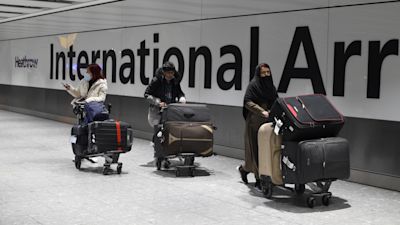Covid: Will forcing arrivals to quarantine in hotels reduce infection?

Video report by ITV News UK Editor Paul Brand
The government is considering tightening Covid controls for people who enter the country, requiring them to isolate in a hotel for 10 days at their own expense.
The system would further limit entry to the UK which has already been tightened to restrict who is allowed to enter the country.
The plans are still under consideration with a final decision due on Tuesday, ITV News UK Editor Paul Brand understands.
Prime Minister Boris Johnson also said the government was “definitely looking at” the possibility of travellers arriving in the UK being required to quarantine in hotels.
What is the current system?
The government suspended the travel corridor system on 18 January and replaced it with a blanket rule for all arrivals into the country.
Currently, anyone wishing to enter the UK has to have evidence of a negative Covid-19 test result taken within 72 hours of their arrival in the country.
Even with the negative test the person must still self-isolate for 10 days after arriving, or five days if they receive another negative result after arriving.
What is the government planning?
The proposed changes could see the rules change so that arrivals to the UK would have to spend their self-isolation at a hotel near the airport they arrived at.
Anyone who enters this self-isolation would have to pay themselves for the cost of staying in the hotel for 10 days.
It is understood there are currently disagreements over whether to apply the new rules to just at-risk countries or globally.
Boris Johnson discusses requiring people to quarantine in hotels
The prime minister has confirmed the UK is considering the plan due to the risk of the new variants.
Mr Johnson said: "We have to realise there is at least the theoretical risk of a new variant that is a vaccine-busting variant coming in, we’ve got to be able to keep that under control."
He added: “That idea of looking at hotels is certainly one thing we’re actively now working on.
"We need a solution that gives us the maximum possible protection against reinfection from abroad."
Simon Calder breaks down what the new rules mean for people who need to fly
Why are the rules being tightened even further?
The government has faced sustained criticism throughout the pandemic for keeping the UK's borders relatively open.
The closure of travel corridors was criticised as coming too late - but the government insisted they decided to act when they did due to the risk of new variants.
The UK is currently vaccinating almost 500,000 people a day against Covid-19, though scientists have warned the vaccines may not offer protection against some variants of the disease.
Early research suggests the vaccine does work against the Kent variant, but experts are not so sure about the South African and Brazilian variants - both of which have been highlighted by the government as a cause for concern.
Paul Brand details what we know of the plans being considered by the government
The government wants to limit the spread of any foreign variants as much as possible, to avoid an outbreak that could derail vaccine efforts.
While scientists have said it is likely the vaccines could be updated to protect against the new variants, the government does not want the people already vaccinated to be exposed to the new variants.
Would the new system work?
The tightening of borders has been called for a long time by the Labour Party and several top scientists.
ITV News Political Editor Robert Peston describes the government's thinking
Australia currently has a similar system where people who arrive in the country must quarantine in a special hotel before being allowed to mix with the rest of the population.
Due to the tight quarantine rules and swift harsh lockdown measures, Australia has been able to keep the pandemic mostly under control - the country reported five new cases on Sunday.
The system didn't work perfectly across the country, however, with a report by the state of Victoria finding the lack of training provided to staff at the hotels led them to catching the disease and spreading it to the wider community.
The system has worked in Australia because they managed to get local circulation to extremely low levels.
The UK still currently has very high levels of infection, with over 30,000 cases reported on Sunday.